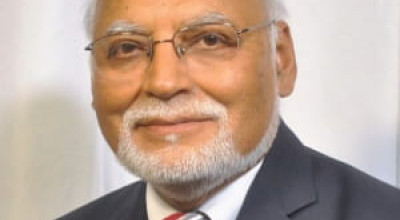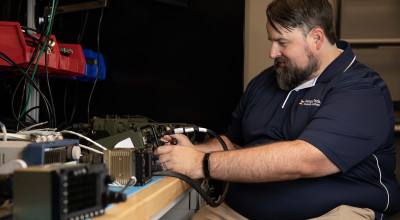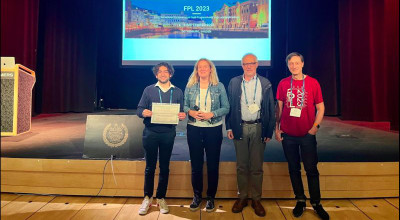
Growing up, David Tran knew he would attend college. There was no question about it. He hoped to follow in the footsteps of his uncle, Cam Voung, who was the first in his family to earn a college degree.
Tran’s uncle, acting as his mentor, helped raise Tran and his siblings while Tran’s parents worked to support the family. Vuong also sponsored Tran’s family so they could come to the United States. A refugee from Vietnam, Tran’s uncle escaped to the Malaysian island of Pulau Bidong in a tiny, cramped boat so that his family could fly to America in an airplane.
“He would tell me stories of chopping wood [and] eating only one bag of instant noodles per meal to survive,” Tran recalled. “It was much easier for us.”
In 2000, Tran’s dream became a reality after graduating from Georgia State University with a degree in computer science. Afterward, he accepted a job at the nonprofit applied research arm of the Georgia Institute of Technology (Georgia Tech)— Georgia Tech Research Institute (GTRI). Later, in 2009, Tran earned a master’s degree in human-computer interaction from Georgia Tech while working at GTRI. He became the first in his family to earn a master’s degree.
Now a software engineer, Tran tells his story of finding creativity in computer science.

Finding his Passion
Before college, Tran did not envision himself as a software engineer. In high school, he loved art and enjoyed drawing figures and comics.
“Initially, I wanted to do something related to art,” Tran recalled. But his father dissuaded him thinking it would be difficult to find a job in that field.
“So computer science became the default choice, given my uncle was also in the IT field,” Tran said.
Throughout his studies, Tran realized that he could use his artistic mindset in the computer science field, especially after completing his master’s in human-computer interaction.
“That [discipline] had the user-experience, artistic side to computer science,” Tran explained, “like, how to create interfaces that are easy to use based on evidence. And so, that became my passion as I worked with GTRI.”
Toward the beginning of his career, Tran mainly worked on creating tools to help engineers at GTRI do their work. Later on, his work evolved into more front-end development, where he found his passion.
Now, Tran gets to focus on improving the user experience. His work involves creating mockups and helping to make things understandable, clean, and visually appealing.
“I tell my wife, ‘This is a dream job. I love what I’m doing right now,’” Tran said.
Supporting the End-User
Tran has worked on many projects over the past 20 years of his GTRI career. One of those projects involved modernizing tools used in the Army Community Service (ACS) — a program that provides various social services to military families, such as financial counseling, support for new parents, and helps with finding employment.
For Tran and the entire time working on the ACS project, it was critical to ask questions and gain a robust working knowledge of the needs of their stakeholders. Tran’s expertise in computer science and artistic mindset allows him to think about the end-users and military families who will be impacted by his work. He tries his best to understand their perspective and hopes his team will create something that has a positive impact.
“It’s really exciting to see that we’re able to create something that could help [ACS staff’s] workflow,” Tran said.

Creating a user-friendly and intuitive system allows the ACS staff to focus on serving military families, rather than struggle with the technology.
Tran considers the end-users’ experiences in every project he works on — including projects outside of GTRI. For example, on the weekends, Tran helps his church set up worship service with an online church platform, ensuring that people can access the service online.
Always Learning
Since Tran joined GTRI in 2001, he has received numerous awards for excellent teamwork, customer focus, strong work ethic, taking initiative, and integrity. He also co-authored a paper on resource consumption in the household.
Still, with over 20 years of experience, Tran wants to be continually learning. As a Christian, he is motivated by the Bible’s words, especially Philippians 2:3, which says, “Do nothing from selfish ambition or conceit, but in humility count others more significant than yourselves. (ESV)”
He takes this verse as a reminder that he does not know everything and shouldn’t think of himself as more knowledgeable than others. Since technology is constantly changing, Tran knows there are many opportunities to improve his skills and learn new things — and GTRI provides that opportunity for all its employees through training events, courses offered through Georgia Tech Professional Education (GTPE), and more.
“GTRI is a great opportunity for growth,” Tran said. “It’s a really nice place to work, and to learn new things, and to work on different projects.”
Ode to Art
Tran has not given up his passion for art. At home, he draws comics for his children, illustrating the bedtime story he told them the previous night. His kids may sometimes add dialogues to the drawing and practice their reading and writing skills; it’s a tradition that brings joy to his family.
Tran’s story is an example of creativity’s clashing with technology — and how both mindsets can be intertwined. Also, it’s evidence that you find fulfillment in your job, even if it’s something you didn’t envision yourself doing that as a child.
“Thinking back, it’s interesting to see my passion started in art, and now it is also in art,” Tran said “I believe it’s all part of God’s plan. I just have to stop and reflect on all the good things He has put in my life.”

Writer: Kaitlyn Lewis
Photographer: Sean McNeil





